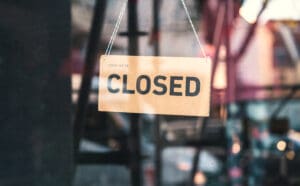
The number of businesses going bust in England and Wales jumped last month to its highest level since the start of the pandemic, as experts predicted that the end of government support for indebted firms would lead to a surge in insolvencies next year.
Some of the energy industry’s newest suppliers were among the 1,446 companies to go under in September – a 7.2% increase on the previous month.
Utility Point, People’s Energy, PfP Energy and MoneyPlus Energy ceased trading during the month, and a string of energy companies have subsequently gone bust amid record energy market prices.
The chilled food delivery business EVCL Chill, based in Alfreton, Derbyshire, collapsed into administration, in part as a result of the HGV driver shortage.
The Insolvency Service said the increase in September meant the number of insolvencies was up 56% compared with September 2020’s figure of 928.
Most government measures that protected firms from creditors were lifted in September, fuelling concerns that many companies that were forced to borrow heavily to survive during the pandemic will collapse next year.
A recent Bank of England report found that a third of UK’s small businesses were classified as highly indebted with debt levels of more than 10 times their cash balances, compared with 14% before Covid-19.
Euler Hermes, a leading trade credit insurer, said it expected this year’s 17,100 likely insolvency total to rise above 20,000 next year in the UK, representing a 32% increase. That compares with predictions of a 68% increase in Italy, 23% in France, and 4% in Germany.
Maxime Lemerle, the firm’s head of insolvency research, said: “Numerous factors will set the tone for the path ahead. These include the momentum of the global economic rebound, the pace of withdrawal of state support, and the many fragile companies still at high risk of default – notably the pre-Covid-19 ‘zombies’ kept afloat by emergency measures – and the companies weakened by extra indebtedness from the crisis.”
Claire Burden, partner in the consulting team at Smith & Williamson, said the energy crisis and the rising cost of transport was likely to reverberate through other sectors, causing firms in manufacturing to call in the receivers, adding that the end of commercial tenant protections in March 2022 will cause another spike.
Nicky Fisher, the deputy vice-president of the insolvency trade body R3, said the economic situation was becoming more difficult for many industries.
“Consumers are now increasingly cautious about the state of the economy, their personal finances and the increased cost of living and are more wary about spending their money.
“And with widespread supply chain disruption and significant wholesale energy price increases building up between September and October, there is likely to be little slack in the system for businesses and individuals who have yet to get back on their feet following the impact of Covid.”
Personal insolvencies rose by 9% to 9,954 in September compared with 9,118 in August, and were 33% higher than September 2020’s figure of 7,471.
Fisher said the situation was still “tough out there for people”, adding: “Although September saw increases in job vacancies and the number of people in work returned to pre-pandemic levels, a high percentage of those employed are in temporary roles, and more than a million people were still on furlough when the programme closed at the end of the month.”
Read more:
More than 1,400 firms went bust last month in England and Wales
